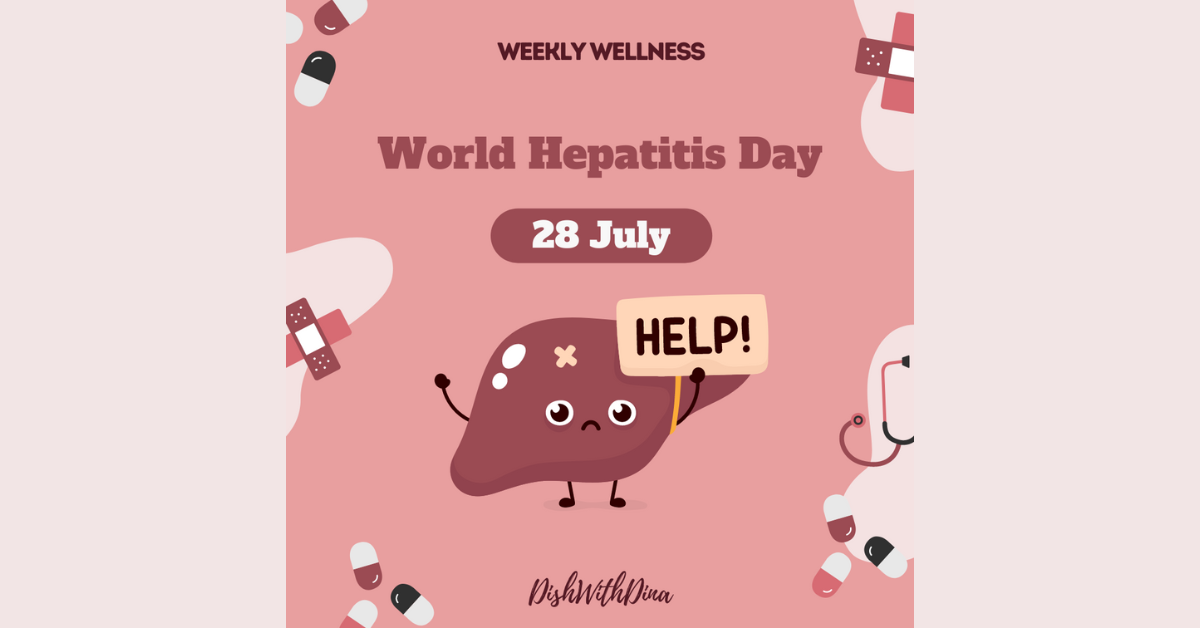Discover key lifestyle modifications to support liver health, backed by research and statistics. Learn about common liver diseases and practical tips for maintaining a healthy liver.
Every year, as we approach World Hepatitis Day, I like to recount the below story, which seems even more relevant as I’m also teaching food service management to undergrads this semester:
My first ever week on the job at the NYC Department of Health & Mental Hygiene back in 2008—before I switched careers and became a Registered Dietitian—came on the heels of a Hepatitis A outbreak in the West Village after a bartender in a swanky restaurant didn’t/forgot to wash his hands one evening after using the bathroom (Hep A is found in fecal matter) and went about his business scooping ice into glasses and making mixed drinks for the Manhattan glitterati.
Flash forward not 24 hours from said fête and everyone who had been on site that night was finding themselves suffering from low fever, nausea, and abdominal pain—typical Hep A symptoms. Enter my trusty DOHMH colleagues who set up shop and immediately started conducting outreach to the patrons to collect info, advise them of treatment (there is none other than to wait it out), intervene with extensive education on employee/restaurant food handler procedures, and provide preventative shots to those in the area to minimize any further spread.
It seems an easy enough ask—wash your hands often, especially after potential contamination like when you’re in the toilet—and you’d think everyone in that community would have learned their lesson; yet, in 2013, another Hep A outbreak happened once again in a similarly swanky restaurant in the heart of the West Village. (See headlines below from both events.) You quite literally can’t make this sh*t up.

Liver Health and Functions
According to the American Liver Foundation, over 50,000 adults in the U.S. died from liver disease in 2020 and about 1 in 400 adults have cirrhosis.
The liver is a highly vascular organ located in the upper right portion of the abdomen which performs the following key functions:
- Metabolism: It metabolizes nutrients from food into forms that the body can use [1].
- Detoxification: The liver filters toxins from the blood, breaking them down or excreting them [6].
- Storage: It stores essential nutrients like vitamins, minerals, and glycogen [4].
- Synthesis: The liver produces important proteins such as albumin and clotting factors [2].
- Regulation: It regulates blood sugar levels and cholesterol metabolism [3].
While the liver has the ability to regenerate (it is capable of regrowing to normal size even after substantial damage), we should still take efforts to protect and support its role in maintaining homeostasis and overall health. The NIDDK shares that research continues to pave the way for new treatments, and ongoing studies focus on early detection, preserving liver function, and innovative treatments like living donor liver transplants.
Hepatitis
Hepatitis is an inflammation of the liver, often caused by a virus, leading to liver complications and debilitating symptoms. While it can take various forms, the most common types are hepatitis A, B, and C.
- Hepatitis A virus does not cause acute liver failure but does account for 20%-25% of hepatitis cases. It is primarily transmitted through food/water contaminated by fecal matter.
- Hepatitis B virus can be an acute or a chronic infection and is passed from person to person through bodily fluids (though it can’t be transmitted through coughing and sneezing).
- Hepatitis C virus is the most common type of hepatitis infections, mainly transmitted through blood (sharing of needles). Most Hep C acute cases turn into chronic cases and it is considered the leading cause of liver cancer and liver transplants.
Symptoms
Common symptoms of Hepatitis A, B, & C may include:
- fever
- loss of appetite
- diarrheal nausea
- dark color of urine
- abdominal discomfort
- jaundice
Other symptoms of Hepatitis C can include bleeding, bruising, and itchy skin; fluid build up in stomach.
Diagnosis
A blood test can diagnose if a person has hepatitis, and if a person is immune from Hep B.
- A blood test can also determine what genotype of Hepatitis C a person has (there are 6).
- An ultrasound or a liver biopsy can determine if there is any liver damage.
Treatments
Treatments & preventions for hepatitis include:
- Vaccination for Hepatitis A & B (there is no vax yet for Hepatitis C).
- Practice safe sex and harm reduction; e.g., sterile needles with illicit drug use.
- Eat foods cooked to proper (safe) temperatures.
- Wash hands after using the restroom, and before and after handling food.
Additional treatments for chronic Hepatitis B & C may include:
- antivirals
- liver transplant
- interferon injection
Other Liver Conditions
Liver conditions in general can be quite complex and vast, so below is a rundown of nutrition and food modifications that you might need to consider if you’re dealing with or are at risk for liver diseases other than hepatitis:
- Bile duct disease. Because bile is necessary for breaking down fats in foods, use fat substitutes or “kernel” oils like olive, corn, peanut, and flax seed which can accommodate the lack/loss of bile.
- Cirrhosis. Protect the liver by limiting salt and sodium-rich foods. Discuss with your doctor if you need a protein restriction.
- Fatty liver disease. Limit high-fat foods, increase fiber-rich foods.
- Hemochromatosis. Since this is directly related to a build-up of iron in the liver, avoid iron-rich foods, iron supplements, uncooked shellfish, and cooking equipment made with iron.
- Wilson disease, which is the build-up of copper in the body, means you’ll have to limit copper-rich foods like chocolate, nuts, shellfish, and mushrooms, and avoid cooking with copper pots.
And, when in doubt on how to manage liver-related conditions—or any chronic disease, for that matter—meet with a Registered Dietitian (like Dina)!
Nutritional Modifications
Generally speaking, unless you’re told by your healthcare provider or dietitian to avoid certain foods, our liver (and overall body) health can benefit from including leafy greens, cruciferous vegetables, and berries in our daily meals, along with adequate fluid/water intake to support detoxification. And, as with most dietary recommendations, if possible, decrease your intake of highly processed foods, trans fats, and excessive (refined) sugar.
- Add leafy greens like spinach and kale to your daily meals for their detoxifying properties.
- Aim to drink at least 8 glasses of water a day to help your liver flush out toxins.
- Reduce or eliminate alcohol consumption to prevent liver damage.
Lifestyle Modifications
At this point, it goes without saying that prioritizing the following lifestyle habits can greatly benefit our overall health and put us at a decreased risk of chronic conditions:
- With your doctor’s clearance, engage in at least 30 minutes of moderate exercise daily to boost liver function.
- Practice mindfulness or meditation to lower stress levels, which can benefit your liver health.
- Get adequate sleep—around 7-9 hours/night.
- …and remember to wash your hands!



0 Comments